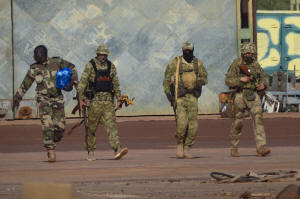Wagner Group leaving Mali after heavy losses but Russia's Africa Corps
to remain
[June 07, 2025]
By MARK BANCHEREAU
DAKAR, Senegal (AP) — The Russia-backed Wagner Group said Friday it is
leaving Mali after more than three and a half years of fighting Islamic
extremists and insurgents in the country.
Despite Wagner’s announcement, Russia will continue to have a mercenary
presence in the West African country. The Africa Corps, Russia’s
state-controlled paramilitary force, said on its Telegram channel Friday
that Wagner’s departure would not introduce any changes and the Russian
contingent will remain in Mali.
"Mission accomplished. Private Military Company Wagner returns home,”
the group announced via its channel on the messaging app Telegram. It
said it had brought all regional capitals under control of the Malian
army, pushed out armed militants and killed their commanders.
Mali, along with neighbors Burkina Faso and Niger, has for more than a
decade battled an insurgency fought by armed groups, including some
allied with al-Qaida and the Islamic State group.
As Western influence in the region has waned, Russia has sought to step
into the vacuum, sweeping in with offers of assistance. Moscow initially
expanded its military cooperation with African nations by using the
Wagner Group of mercenaries. But since the group’s leader, Yevgeny
Prigozhin, was killed in a plane crash in 2023, after mounting a brief
armed rebellion in Russia that challenged the rule of President Vladimir
Putin, Moscow has been developing the Africa Corps as a rival force to
Wagner.
Africa Corps is under direct command of the Russian defense ministry.
According to U.S. officials, there are around 2,000 mercenaries in Mali.
It is unclear how many are with Wagner and how many are part of the
Africa Corps.
Beverly Ochieng, a security analyst specializing in the Sahel for
Control Risks consultancy, said the Russian defense ministry had been
negotiating with Mali to take on more Africa Corps fighters and for
Wagner mercenaries to join Russia’s state-controlled paramilitary force.
“Since the death of Prigozhin, Russia has had this whole plan to then
make the Wagner Group fall under the command of the Ministry of Defense.
One of the steps they made was to revamp or introduce the Africa Corps,
which is the way in which the Russian paramilitaries would retain a
presence in areas where the Wagner group has been operating,” Ochieng
said.
Wagner has been present in Mali since late 2021 following a military
coup, replacing French troops and international peacekeepers to help
fight the militants. But the Malian army and Russian mercenaries
struggled to curb violence in the country and have both been accused of
targeting civilians.

[to top of second column]
|

This undated photograph provided by the French Army shows three
Russian mercenaries in northern Mali. (French Army via AP, File)

Last month, United Nations experts urged Malian authorities to
investigate reports of alleged summary executions and forced
disappearances by Wagner mercenaries and the army.
In December, Human Rights Watch accused Malian armed forces and the
Wagner Group of deliberately killing at least 32 civilians over an
8-month span.
The announcement of Wagner's withdrawal comes as the Malian army and
the Russian mercenaries suffered heavy losses during attacks by the
al-Qaida linked group JNIM in recent weeks.

Last week, JNIM fighters killed dozens of soldiers in an attack on a
military base in central Mali.
Rida Lyammouri, a Sahel expert at the Morocco-based Policy Center
for the New South, said the major losses might have caused the
possible end of Wagner's mission.
“The lack of an official and mutual announcement from both the
Malian authorities and Wagner indicate possible internal dispute
which led to this sudden decision. Simultaneously, this could point
to a new framework for Russian presence in the country," he said.
Replacing Wagner with Africa Corps troops would likely shift
Russia's focus in Mali from fighting alongside the Malian army to
training, said Ulf Laessing, head of the Sahel program at the Konrad
Adenauer Foundation.
“Africa Corps has a lighter footprint and focuses more on training,
providing equipment and doing protection services. They fight less
than the ‘Rambo-type’ Wagner mercenaries,” Laessing said.
___
Associated Press writer Monika Pronczuk in Dakar, Senegal,
contributed.
All contents © copyright 2025 Associated Press. All rights reserved |